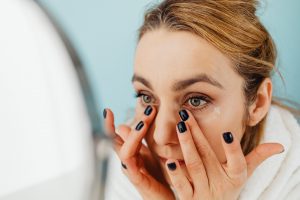Find Solutions

Dark circles are a common skin concern that can affect people of all ages. They can make you look tired, stressed, and older than you really are. They can also be a source of low self-esteem, affecting your confidence and making you feel self-conscious. So, what are the causes of dark circles and what are the most effective treatments? In this blog, we’ll explore these questions and provide you with the information you need to tackle this common beauty issue.
The Causes of Dark Circles
There are several factors that can contribute to the development of dark circles. Some of the most common causes include:
- Genetics: Dark circles can run in families, so if you have a family history of this skin condition, you may be more susceptible to developing them yourself.
- Aging: As you age, the skin under your eyes becomes thinner and loses its elasticity, making the blood vessels more visible. This can cause the skin to look darker and contribute to the formation of dark circles.
- Lack of sleep: When you don’t get enough sleep, your skin can become dull, pale, and tired-looking. This can make the blood vessels under your eyes more visible, resulting in dark circles.
- Stress: Stress can cause a variety of skin problems, including dark circles. When you’re stressed, your body produces cortisol, a hormone that can cause the skin to become paler and thinner. This can make the blood vessels under your eyes more visible, leading to the formation of dark circles.
- Allergies: Allergies can cause inflammation and swelling, which can result in dark circles. They can also cause you to rub your eyes, which can further irritate the skin and contribute to the development of dark circles.
- Sun exposure: Sun exposure can cause hyperpigmentation and make dark circles even darker.
- Dehydration: When you’re dehydrated, your skin can become dry, dull, and tired-looking. This can make the blood vessels under your eyes more visible, resulting in dark circles.

Effective Treatments for Dark Circles
There are several treatments available to help reduce the appearance of dark circles. Some of the most effective treatments include:
- Topical creams: Topical creams can help to lighten the skin under your eyes, reducing the appearance of dark circles. Look for creams that contain ingredients such as Vitamin C, kojic acid, and retinol, which can help to brighten and even out the skin tone.
- Cold compresses: Cold compresses can help to reduce swelling and improve blood circulation, making the skin under your eyes look brighter and less tired-looking. Simply place a cold compress, such as a chilled cucumber or tea bag, on your closed eyes for 10-15 minutes.
- Chemical peels: Chemical peels can help to exfoliate the skin and improve the overall appearance of the skin. They can also help to lighten dark circles and improve the skin’s texture and tone.
- Laser therapy: Laser therapy can help to reduce the appearance of dark circles by stimulating collagen production and improving blood circulation. This can help to brighten the skin and make it look more refreshed.
- Microdermabrasion: Microdermabrasion can help to improve the appearance of dark circles by removing dead skin cells and promoting cell renewal. This can help to improve the skin’s texture and tone and make the skin under your eyes look brighter and more refreshed.
- Sleep: Getting enough sleep is essential for healthyskin, and can also help to reduce the appearance of dark circles. Aim for at least 7-8 hours of sleep each night, and avoid staying up late or staying on electronic devices for extended periods of time before bed.
- Hydration: Drinking plenty of water can help to keep your skin hydrated, reducing the appearance of dark circles. Aim to drink at least 8 glasses of water per day to keep your skin looking its best.
- Sun protection: Wearing sun protection can help to prevent sun damage and hyperpigmentation, reducing the appearance of dark circles. Look for a high SPF sunscreen and wear it every day, even on cloudy days.
- Healthy diet: A healthy diet can also help to reduce the appearance of dark circles. Eating plenty of fruits and vegetables, drinking green tea, and avoiding processed foods can help to keep your skin looking its best.
In conclusion, dark circles can be a frustrating skin concern, but with the right treatments and lifestyle changes, they can be effectively managed. Remember to get enough sleep, stay hydrated, protect your skin from sun damage, and eat a healthy diet to keep your skin looking its best. If you’re concerned about your dark circles, talk to your dermatologist about the best treatments for you. With the right approach, you can achieve brighter, more refreshed-looking skin and regain your confidence.

